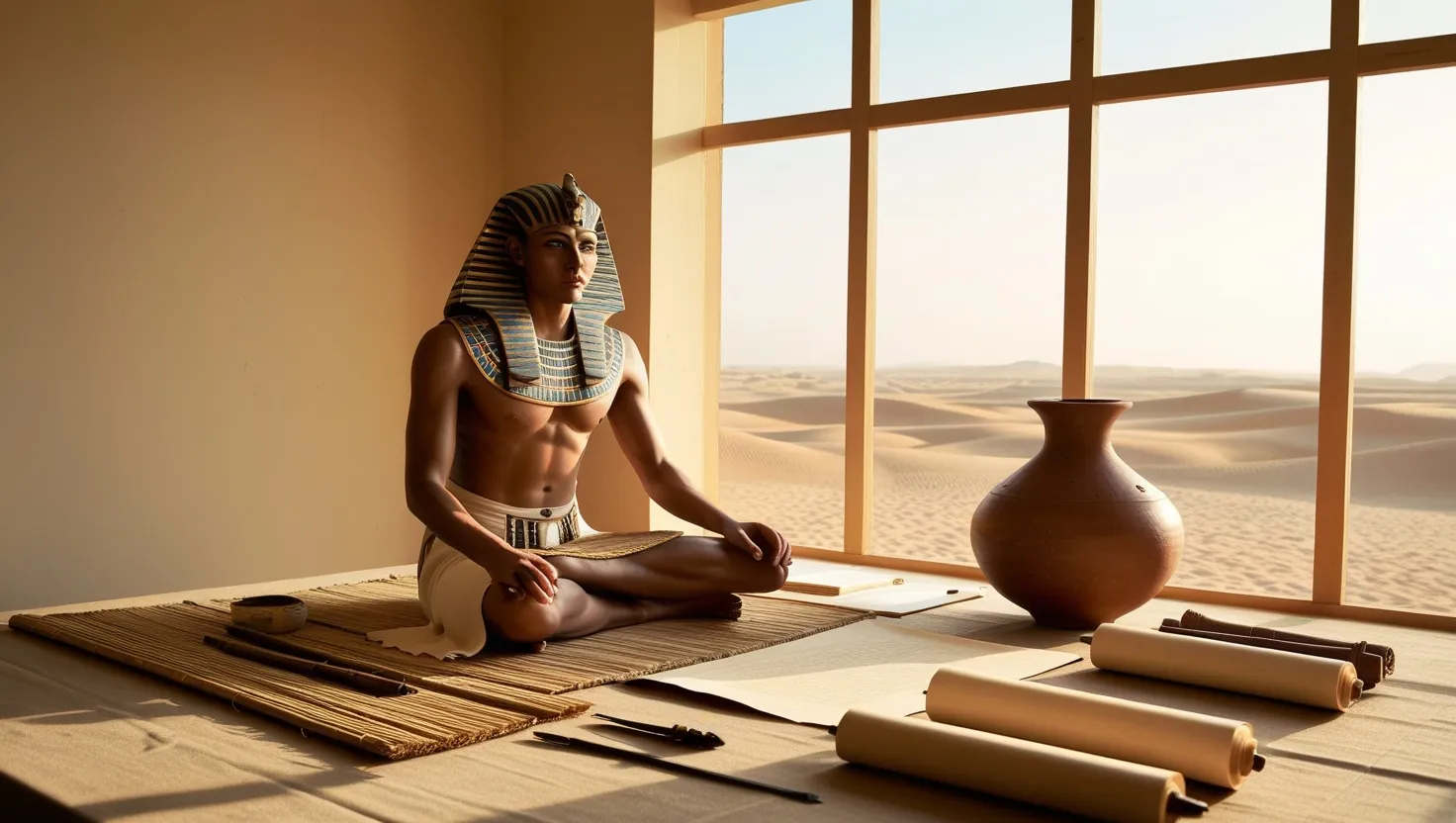Start your day in the same spirit as one of history’s most industrious civilizations, and you might notice something surprising: the habits that fueled ancient Egyptian vitality are both simple and astonishingly relevant today. I find it fascinating how these time-worn customs, polished by centuries along the Nile, still have the power to reset my own focus and energy in a world that rarely slows down.
Ancient Egyptians were relentless about purity and order—not by accident, but by intricate design. They began each morning with water. I like to imagine a crisp dawn beside the Nile, the chill in the air cutting through early fatigue as cold water splashes on my face. There’s a sharpness in this act, a welcome to the senses that feels as vital now as it did then. I always drink a full glass right after—it wakes me up at a level coffee can’t reach and shakes off the grogginess of the previous night. They believed water could wash away more than dust; it could rinse the soul and prepare the mind for whatever lay ahead.
Have you ever drawn a boundary in your home or workspace and found your concentration soaring? Egyptian scribes, essential to the smooth running of their bureaucratic machine, physically marked the areas for their most focused labor. A reed mat wasn’t just for comfort—it made it clear: this is where the work happens. When I designate one spot—for me, a corner desk—I notice my brain stops seeking distractions. It’s an easy, almost automatic way to train my focus. In a fascinating twist, even computer profiles can serve as our modern reed mats, demarcating virtual boundaries just as effectively.
“Order is heaven’s first law.” —Alexander Pope
Our cycles mimic nature more closely than we care to admit. The Egyptians designed their day in tune with the sun’s movement, attuned to subtle changes in natural light. I’ve found incredible value in taking five minutes when the sunlight in my workspace shifts—standing by a window, letting the warmth or brightness refresh my vision and mind. These simple solar-alignment breaks are more powerful than any productivity hack I’ve tried. The truth is, our minds weren’t meant for endless stretches of artificial light and screen-staring. Drawing energy from the sun—literally pausing to honor its journey—can restore attention in a way nothing else seems to.
What flavors remind you of energy and resilience? Ancient Egyptians consumed onions and garlic for their medicinal power and symbolism of strength. I started adding a sharp or pungent flavor—citrus zest in yogurt, a handful of fresh herbs, a few bites of pickled vegetables—to at least one meal a day. These small bursts of flavor demand your attention. They keep me present with what I’m eating, turning a rushed lunch into an act of nourishment. Over time, mindfully selecting and savoring strong tastes helps my digestion, keeps energy steady, and (unexpectedly) breaks the monotony of bland, processed food.
“Let food be thy medicine and medicine be thy food.” —Hippocrates
Another ritual I’ve adopted is twilight review, and the effect on my mindset has been nothing short of transformative. Before dinner, I sit and write down three things I accomplished—no matter how small. Then, I name a particular challenge I faced and acknowledge, out loud, that I got through it. This isn’t empty affirmation; it’s a deliberate separation between work and rest, modeled after the ancient scribes’ custom of cataloging each day’s outcomes. Some days, I surprise myself with quiet victories I might have otherwise forgotten.
Can you recall a recent challenge you handled—big or small? Can you describe it in one sentence, and allow yourself to feel that real progress?
By integrating these rituals, I find that structure begins to flow into the spaces where chaos usually slips through. The Egyptians weren’t obsessed with routine for routine’s sake. They practiced for purpose—a life balanced between action and pause, engagement and retreat, consumption and reflection. Each act, no matter how ordinary, was sharpened with intention.
There’s a lesser-known aspect to Egyptian daily life I find unexpectedly modern: their commitment to cleanliness went far beyond appearances. Shaving heads, frequent bathing, and even cleaning house were spiritual acts as much as they were practical. Cleanliness kept disease at bay, sure, but it also symbolized a fresh start. Today, when I take five minutes to tidy my workspace before bed, I feel the psychological reset that maintained their vitality throughout the centuries.
Children imitated adults in more ways than dress or speech. In their rituals, families often gathered together, reinforcing community bonds through shared practice. I try to make space for a communal meal a few times a week, shutting out screens and talking—really talking—about the day. The Egyptians’ strength wasn’t only in individual focus, but collective energy: everyone pitched in to keep the wheel turning, whether in harvest or in home life.
“The strength of the team is each individual member. The strength of each member is the team.” —Phil Jackson
Seasonal festivals and sports filled gaps between harder work. If productivity seems synonymous with relentless toil, remember that ancient Egyptians played games, participated in community festivals, and valued downtime as a part of their thriving. Their “board games,” like Senet, weren’t trivial amusements; they were woven into rituals of strategy and fate, reminding us to mix play and purpose.
If you traced a typical Egyptian day, you’d discover a rhythm: cleanse, create, connect—then withdraw and review. There’s an elegance in the way they honored both beginnings and endings. Even the act of closing the shrine at night—a small ceremony marking the cessation of duties—parallels my own decision to set devices on “do not disturb” after a certain hour.
Their attention to boundary-setting went far deeper than physical space. Priests performed dozens of ceremonies in sequence, uttering a unique phrase for each step, ensuring no line blurred between sacred and mundane. In my life, I replicate this segmentation by grouping tasks and mentally transitioning between phases, never allowing work to quietly bleed into time reserved for rest or personal reflection.
What would change if you began each workday by physically, or digitally, “entering” your workspace and only left when you transitioned out of work mode deliberately? Could such a simple act ward off the fatigue and fuzzy boundaries that plague modern routines?
The Egyptians saw food as both fuel and symbol. For them, an offering wasn’t about the item’s value, but the energy and intention behind it. When I approach a meal with a moment of gratitude—just long enough to notice flavor, warmth, or color—I find my digestion improves, and so does my satisfaction. These micro-rituals encourage me to eat less distractedly, and over time, lead to steadier energy and better focus.
In the same way that sunlight was tracked for both religious observance and daily life, I pay attention to my own circadian cues. If I start to slump mid-afternoon, I don’t push through in a rush; instead, I replicate the ancient habit of pausing with the light—often just stepping outside or moving to a brighter room. The reward is sharper focus for the remainder of my task.
As evening draws in, the twilight review offers closure. By giving credit to myself for what I managed—rather than fixating on what’s left undone—I lower anxious thoughts and condition myself to see evidence of progress every day. When I mark the line between work and night, sleep becomes deeper, more restorative.
There’s a temptation to complicate upgrades to our energy and concentration—seeking gadgets, intricate diets, or multi-step routines. Yet the Egyptians show us that the most robust foundations are built with ordinary acts performed with heightened awareness. It’s not what you own, but how you notice, prepare, consume, pause, and reflect that shapes resilience and focus.
So, why not gather inspiration from the desert and the Nile? Begin the day rinsing dust from your face and drinking cool water. Mark your workspace, physically or virtually. Honor the sun’s passage with quick pauses and tune your body to nature’s rhythm. Include a punch of flavor—a symbol of strength—at every meal. As the day ends, acknowledge what you’ve moved forward, say it aloud, and give yourself closure.
“You cannot plough a field by turning it over in your mind.” —Gordon B. Hinckley
I invite you to try one of these rituals this week. Which small step, borrowed from the past, could shape your focus or vitality for tomorrow?






